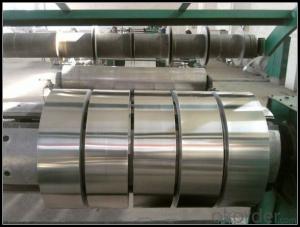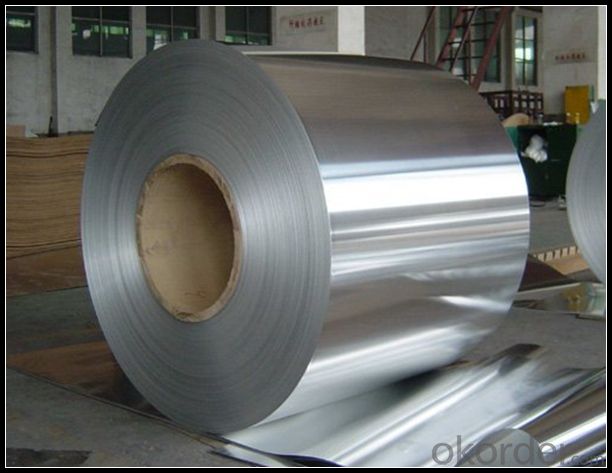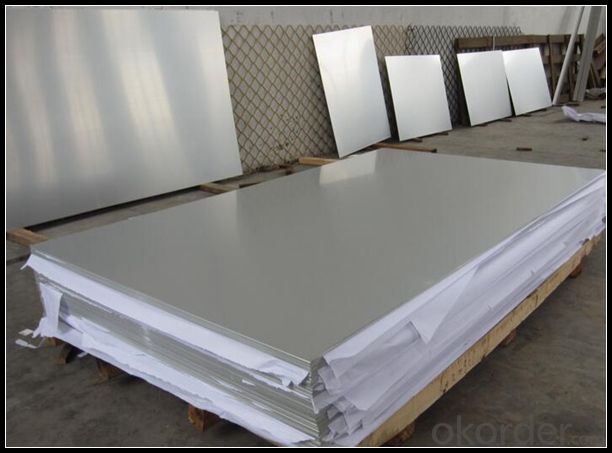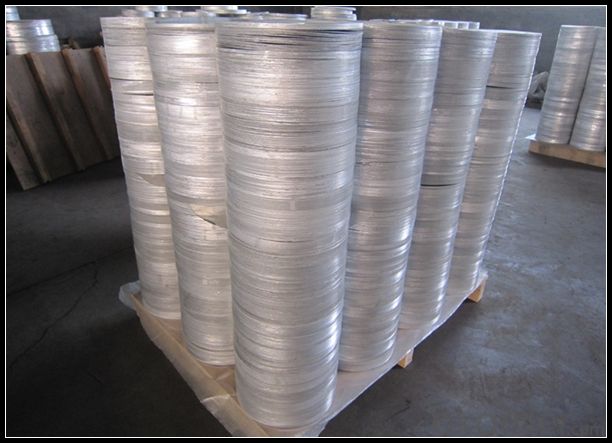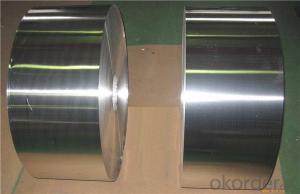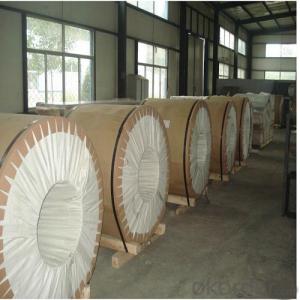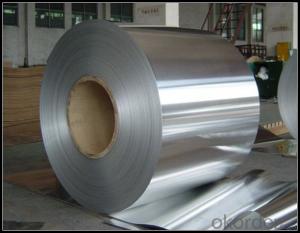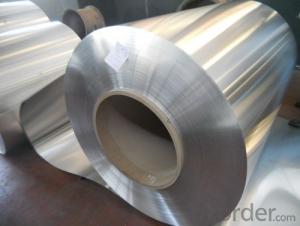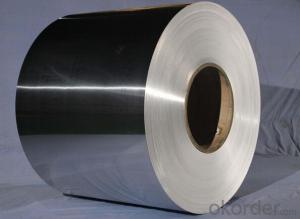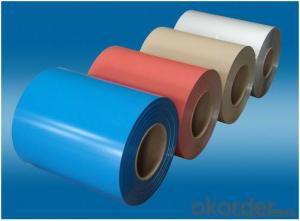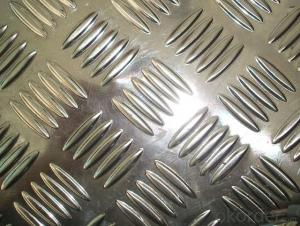Brazing Aluminum Coil - China Supply High Quality Aluminum Plate for Building
- Loading Port:
- Shanghai
- Payment Terms:
- TT OR LC
- Min Order Qty:
- 3 m.t.
- Supply Capability:
- 3800 m.t./month
OKorder Service Pledge
OKorder Financial Service
You Might Also Like
Specification
1. Specification of Aluminum
1) Alloy | 1050,1060,1100, 3003 3004 3105 3005 5005 5052 etc |
2) Temper | O/H12/H14/H1/H18/H32/H34/H36/H38//H111/H112/H116/H321/T6/T651/T3/T351 etc |
3) Thickness | 0.1mm to 6mm |
4) Width | 20mm to 3300mm |
5) Coil weight | 100kgs to 6 tons depends on actual requirement |
6) Core material | Aluminum alloy |
7) Coil Inner diameter | 76mm, 152mm,or as required |
2. Application of Aluminum
(1).Interior: wall cladding, ceilings, bathrooms, kitchens and balconies, shutters, doors...
(2).Exterior: wall cladding, facades, roofing, canopies, tunnels,column covers , renovations...
(3).Advertisement: display platforms, signboards, fascia, shop fronts...
3. Feature of Aluminum
*Such coil is specially designed to replace aluminum ingot, due to the high export tax of aluminum ingot, the coil has better price than ingot.
*This type of coil can fit customer's remelting furnace just like ingot, no need to make any change to the production line that was previously used for ingot. The standard coil size and weight is very suitable for the feed gate of furnace.
*This type of coil causes less material wastage than ingot when remelted.
*Our coil is made directly from ore, no need to go though the ingot making process, quality is much better than other suppliers who use ingot scrap to make coil.
Be free from Oil Stain, Dent, Inclusion, Scratches, Stain, Oxide Dicoloration, Breaks, Corrosion, Roll Marks, Dirt Streaks and other defect which will interfere with use
4. Certificate:
SGS and ROHS(if client request, paid by client), MTC(plant provided), Certificate of Origin(FORM A, FORM E, CO), Bureau Veritas and SGS (if client request, paid by client), CIQS certificate
5. Image of Aluminum
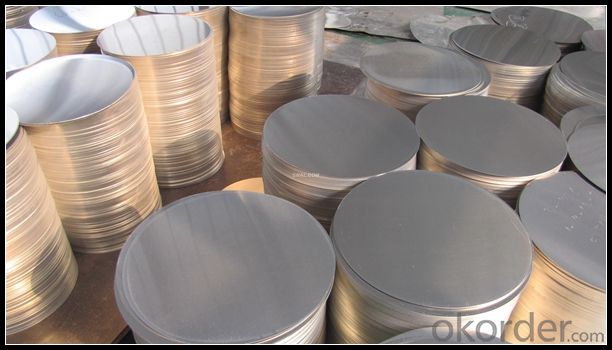
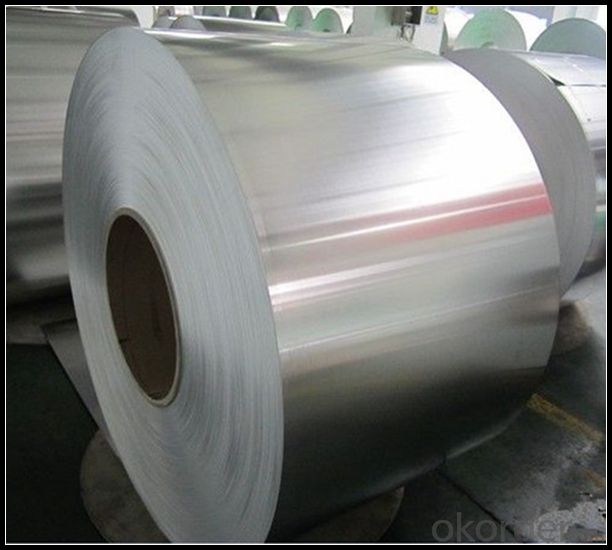
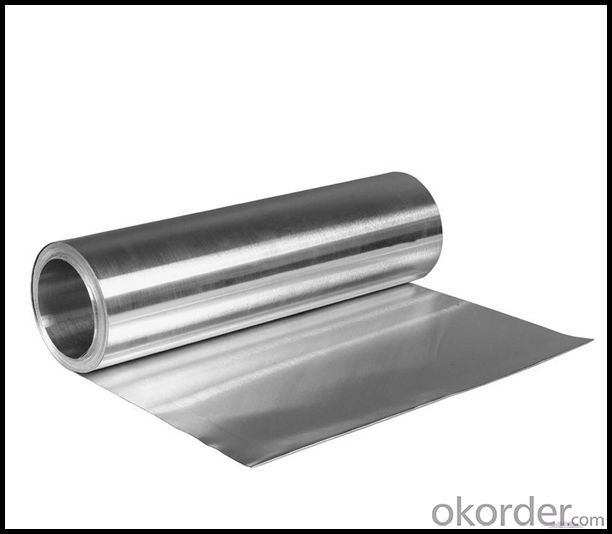
6. Our Service
1. Reply your enquiry in 24 working hours. |
2. OEM, buyer design, buyer label services provided. |
3. Exclusive and unique solution can be provide to our customer by our well traned and professional engineers and staffs. |
4. We can provide free sample for your check |
5. We have the certification of ISO 9001 |
6. Timely delivery |
7. Special discount and protection of sales area provided to our distributor. |
8. Good after-sale service. |
7. FAQ
Q: What is the produce prase? |
A: Normally it would be 40days after received your deposit. |
Q: Can you provide free samples? |
A: Yes, free samples will be sent to you on freight at destination. |
Q: Can I get your latest catalogue? |
A: Yes, it will be sent to you in no time. |
Q: What is the MOQ? |
A: 3 tons |
Q: What are your payment terms? |
A: We accept L/C, D/A, D/P, T/T, West Union,etc. |
- Q: How do aluminum coils contribute to energy-efficient windows and doors?
- Aluminum coils play a significant role in making windows and doors energy-efficient. Firstly, aluminum is a highly conductive material, meaning it can efficiently transfer heat and cold. This property allows aluminum coils to act as a thermal barrier, preventing the transfer of heat from the outside to the inside and vice versa. By minimizing heat transfer, aluminum coils help to reduce the amount of energy needed to cool or heat a building, resulting in lower energy consumption and reduced utility bills. Additionally, aluminum coils are often used in the construction of window and door frames due to their lightweight and durable nature. This lightweight property makes it easier to install and operate windows and doors, while their durability ensures long-lasting performance. The use of aluminum coils also allows for the creation of sleek and narrow frame designs, maximizing the glass area and allowing more natural light to enter the building. This reduces the need for artificial lighting during the day, further contributing to energy savings. Moreover, aluminum is a highly recyclable material, and the use of aluminum coils promotes sustainability. By using recycled aluminum to manufacture these coils, energy-efficient windows and doors can be created with a lower carbon footprint. This reduces the environmental impact of the building industry and contributes to a more sustainable future. In conclusion, aluminum coils contribute to energy-efficient windows and doors through their thermal barrier properties, lightweight and durable nature, and recyclability. By minimizing heat transfer, facilitating efficient installation, and reducing the use of artificial lighting, aluminum coils play a key role in creating sustainable and energy-saving building solutions.
- Q: What are aluminum coils?
- Aluminum coils, wound in a spiral shape, are thin and flat pieces of aluminum. Their versatility and durability make them commonly utilized in various industries. These coils are typically crafted from high-quality aluminum alloy, which grants them qualities such as lightweight, corrosion resistance, and ease of manipulation. A wide range of applications, including building and construction, automotive manufacturing, electrical appliances, and packaging, benefit from the use of aluminum coils. Depending on the specific requirements of the industry or product, these coils can be further processed into different forms, such as sheets, foils, or strips. Altogether, aluminum coils are crucial components in numerous manufacturing processes and play an essential role in diverse industries.
- Q: Are there any limitations to the coil weight of aluminum coils?
- Yes, there are limitations to the coil weight of aluminum coils. The coil weight of aluminum coils is primarily limited by the capacity of the equipment used for handling and transporting the coils. Different machinery and materials handling systems have different weight capacities, and exceeding these capacities can lead to safety hazards and damage to the equipment. Additionally, the size and dimensions of the coils can also impact the maximum weight limit. Larger coils tend to have a higher weight limit, as they have a larger surface area to distribute the load. However, there is a practical limit to the weight that can be carried by the machinery and equipment, regardless of the coil size. Moreover, the strength and integrity of the material being used also play a role in determining the coil weight limit. Aluminum is a lightweight material with a high strength-to-weight ratio, which allows for larger coil weights compared to other materials. However, extreme weight can cause deformation or damage to the coil, affecting its quality and usability. It is important to consider these limitations and adhere to the manufacturer's recommendations and industry standards when determining the maximum coil weight. Proper handling, storage, and transportation procedures should be followed to ensure the safety of personnel and the integrity of the aluminum coils.
- Q: How much will be burned out if the soaked and oxidized 5182 aluminum coil is melt down and reprocessed?
- Burn out rate is generally between 1% -2.5%, but that varies among plants as their actual situations are different.
- Q: What specific conditions or precautions are necessary to ensure the proper storage of aluminum coils to maintain their quality and prevent damage?
- <p>Yes, there are special requirements for storing aluminum coils to ensure their quality and prevent damage. Aluminum coils should be stored in a cool, dry place away from direct sunlight and moisture. They should be kept on flat, level surfaces with proper support to prevent warping or denting. It's also important to avoid stacking them too high to prevent crushing. Additionally, coils should be protected from contact with corrosive materials or chemicals that could cause oxidation or staining. Proper labeling and tracking of coils is also essential for inventory management.</p>
- Q: What are the factors that affect the price of aluminum coils?
- There are several factors that can affect the price of aluminum coils. One of the primary factors is the global supply and demand for aluminum. If there is a shortage of aluminum, the price of aluminum coils is likely to increase. On the other hand, if there is an oversupply of aluminum, the price may decrease. Another factor that can impact the price of aluminum coils is the cost of raw materials. Aluminum is derived from bauxite, and the cost of mining and extracting bauxite can vary depending on factors such as labor costs, energy prices, and government regulations. Any changes in these factors can affect the overall cost of producing aluminum, which in turn can influence the price of aluminum coils. Transportation costs also play a role in determining the price of aluminum coils. Aluminum is often transported over long distances, and the cost of shipping or trucking can vary depending on fuel prices, distance, and other logistical factors. Higher transportation costs can add to the overall price of aluminum coils. Currency exchange rates can also impact the price of aluminum coils. Aluminum is traded on global markets, and changes in exchange rates can affect the cost of importing or exporting aluminum. If the currency in which aluminum is traded strengthens against other currencies, the price of aluminum coils may increase. Lastly, market competition can affect the price of aluminum coils. If there are multiple suppliers of aluminum coils, they may compete with each other to secure customers. This competition can lead to price fluctuations as suppliers try to attract buyers by offering competitive prices. In conclusion, the price of aluminum coils can be influenced by factors such as global supply and demand, the cost of raw materials, transportation costs, currency exchange rates, and market competition. Understanding these factors can help businesses and consumers anticipate and respond to changes in the price of aluminum coils.
- Q: How are aluminum coils processed for specific surface coatings?
- Aluminum coils are processed for specific surface coatings through a series of steps. First, the coils go through cleaning and pre-treatment processes to remove any impurities and ensure proper adhesion of the coating. This step involves degreasing, etching, and rinsing. After pre-treatment, the coils are coated with the desired surface finish using techniques like coil coating or coil painting. This involves applying a layer of paint or coating material onto the surface of the coils using rollers or sprayers. Finally, the coated coils are cured or dried through heat treatment to ensure proper bonding and durability of the surface coating.
- Q: Can aluminum coils be utilized in the process of welding?
- <p>Yes, aluminum coils can be used for welding work. They are commonly used as filler material in processes like MIG (Metal Inert Gas) welding. Aluminum welding requires specific techniques and equipment due to its high thermal conductivity and the need for shielding from oxidation. The aluminum coils must be of good quality and compatible with the welding process to ensure a strong and durable weld. Proper selection of welding parameters, such as amperage and voltage, is crucial for successful aluminum welding.</p>
- Q: What are the different types of aluminum coils available in the market?
- In the market, one can find various types of aluminum coils, each possessing its own distinct characteristics and applications. 1. Basic Aluminum Coils: These coils are simple and commonly used for general purposes. They have a smooth surface and find applications in industries like construction, automotive, and packaging. 2. Aluminum Coils with Enhanced Aesthetic Appeal: These coils are coated with paint or other finishes to improve their visual appeal and provide extra protection against corrosion. They are widely used in the manufacturing of building facades, signage, and decorative items. 3. Textured Aluminum Coils: These coils have a textured or patterned surface, which gives them a decorative appearance and makes them slip-resistant. They are often utilized in applications where both aesthetics and functionality are important, such as flooring, staircases, and decorative panels. 4. Anodized Aluminum Coils: Through the anodizing process, a protective oxide layer is formed on the surface of these coils. This enhances their resistance to corrosion and makes them suitable for outdoor applications, including architectural elements, electronic components, and the aerospace industry. 5. Pre-painted Aluminum Coils: These coils come with a pre-applied paint coating, eliminating the need for additional painting or finishing. They are frequently used in industries that require high-quality, durable, and consistently colored products, such as automotive, appliances, and electronics. 6. Aluminum Coils for Heat Transfer: Specifically designed for heat transfer purposes in air conditioning and refrigeration systems, these coils have high thermal conductivity. They are often made from alloy grades that offer excellent corrosion resistance in harsh environments. Considering the specific requirements and intended use of the aluminum coil is crucial before making a purchase. This ensures that the appropriate coil type is selected for the desired application, optimizing performance and longevity.
- Q: Is it possible to use a welding torch for joining steel coils?
- <p>Yes, you can use a welding torch to weld steel coils together. However, it's important to choose the right type of welding process suitable for the specific steel grade and the desired strength of the joint. Common methods include gas metal arc welding (GMAW), shielded metal arc welding (SMAW), and flux-cored arc welding (FCAW). Ensure you follow safety protocols, use appropriate protective gear, and have a good understanding of the welding process to achieve strong, reliable welds.</p>
Send your message to us
Brazing Aluminum Coil - China Supply High Quality Aluminum Plate for Building
- Loading Port:
- Shanghai
- Payment Terms:
- TT OR LC
- Min Order Qty:
- 3 m.t.
- Supply Capability:
- 3800 m.t./month
OKorder Service Pledge
OKorder Financial Service
Similar products
Hot products
Hot Searches
Related keywords
